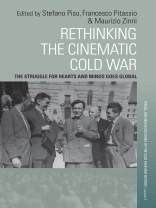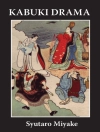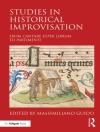Historical consensus increasingly views the Cold War period as a multifaceted conflict which extended beyond the borders of the USSR and USA, encompassing both cultural and diplomatic history. Debate remains, however, about how best to balance the Cold War as a cultural event with the existence of Cold War culture. Rethinking the Cinematic Cold War provides a fresh reassessment of this period, highlighting how the convergence of geopolitical interests, cultural production and exchange, and technological and media history shaped a unique epoch. Consequently, this volume seeks to diagnose the role cinema played in expanding the ideological outlook of artists, audiences, and policymakers.
Mục lục
Introduction: Expanding the Cinematic Cold War or: How We Learned to Cross Boundaries and Look at Bigger Pictures
Stefano Pisu, Francesco Pitassio, and Maurizio Zinni
Chapter 1. The Burden of Winning: American Cinematographic Policy in Italy in the Years of the Allied Military Administration (1943–1945)
Maurizio Zinni
Chapter 2. The Struggle to Save Progressive Unions: Carl Marzani and Union Films
Rosemary Feurer and Charles Musser
Chapter 3. A ‘Trojan Horse in the Enemy Camp’: Vatican Plans for a Catholic Third Way on the Chessboard of Cold War-Era Cinema (1939-1958)
Gianluca della Maggiore
Chapter 4. An Impossible Cinematic Hegemony: Soviet Films in Italy between Postwar and the Cold War (1944–1953)
Stefano Pisu
Chapter 5. Soviet Cinematic Diplomacy from New York to Beijing, 1949: Sergei Gerasimov and his Documentary Films
Marsha Siefert
Chapter 6. The Rise and Fall of Sino-Soviet Film Festival Diplomacy (1957-1966)
Elena Razlogova
Chapter 7. Making Ground for Film Export: Soviet Films’Competition with Hollywood in India in the 1950-1960s
Severyan Dyakonov
Chapter 8. The Film Market at the Time of Independence: France’s Former African Colonies and the Cinematic Cold War in the 1960s
Gabrielle Chomentowski
Chapter 9. The Troubles of Non-Alignment: International Pacifism, Transnational Style and Production Strategies in the Case of Rat (Atomic War Bride, Veliko Bulajić, 1960)
Francesco Pitassio
Chapter 10. From Anticommunism to Third-Worldism: The Transformation of Mexican Cinema in the Cold War of the 1970s
Israel Rodrìguez
Chapter 11. Cold War and Film Festivals in the Aftermath of 1968
Dina Iordanova
Chapter 12. To Catch Up and Overtake… Europe: Technology Transfer and Its Limits in the Soviet Cinema under Brezhnev
Catriona Kelly
Chapter 13. Missed Opportunities and Unexpected Success: Film Relationships between France and the GDR in the 1970s
Perrine Val
Chapter 14. The Chilean Cultural Project during Unidad Popular (1970–1973): The Interview between Roberto Rossellini and Salvador Allende
Margherita Moro
Chapter 15. ‘Ideological Threat of Italian Movies’: The KGB, Mafia, Punk-Rock, and Rise of Neo-Fascism among Soviet Youth (1982-1985)
Sergei Zhuk
Conclusion: Close Encounters around the World
Stefano Pisu, Francesco Pitassio and Maurizio Zinni
Filmography
Index
Giới thiệu về tác giả
Maurizio Zinni is Associate Professor of Contemporary History at Sapienza University in Rome. A member of the editorial board of Mondo contemporaneo and Cinema e storia, his research primarily focuses on modern icons as sources for contemporary history and on the role of the media as agents of history in the construction of modern identity. His writings include Fascisti di celluloide (Marsilio, 2010), which was the winner of the SISSCO First Work award, and Visioni d’Africa(Donzelli, 2023).












